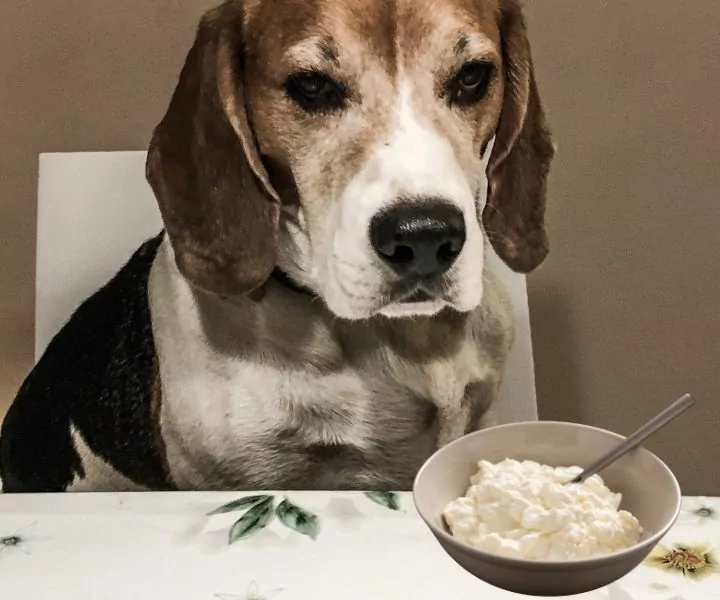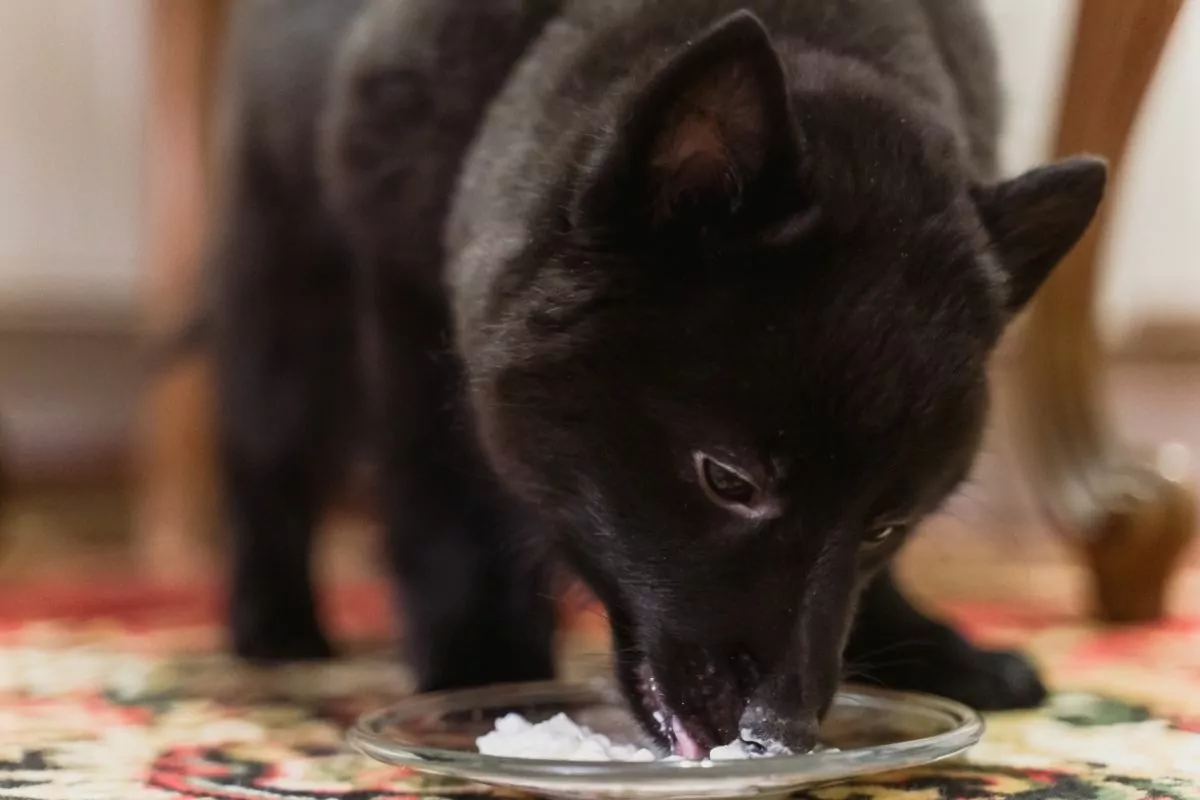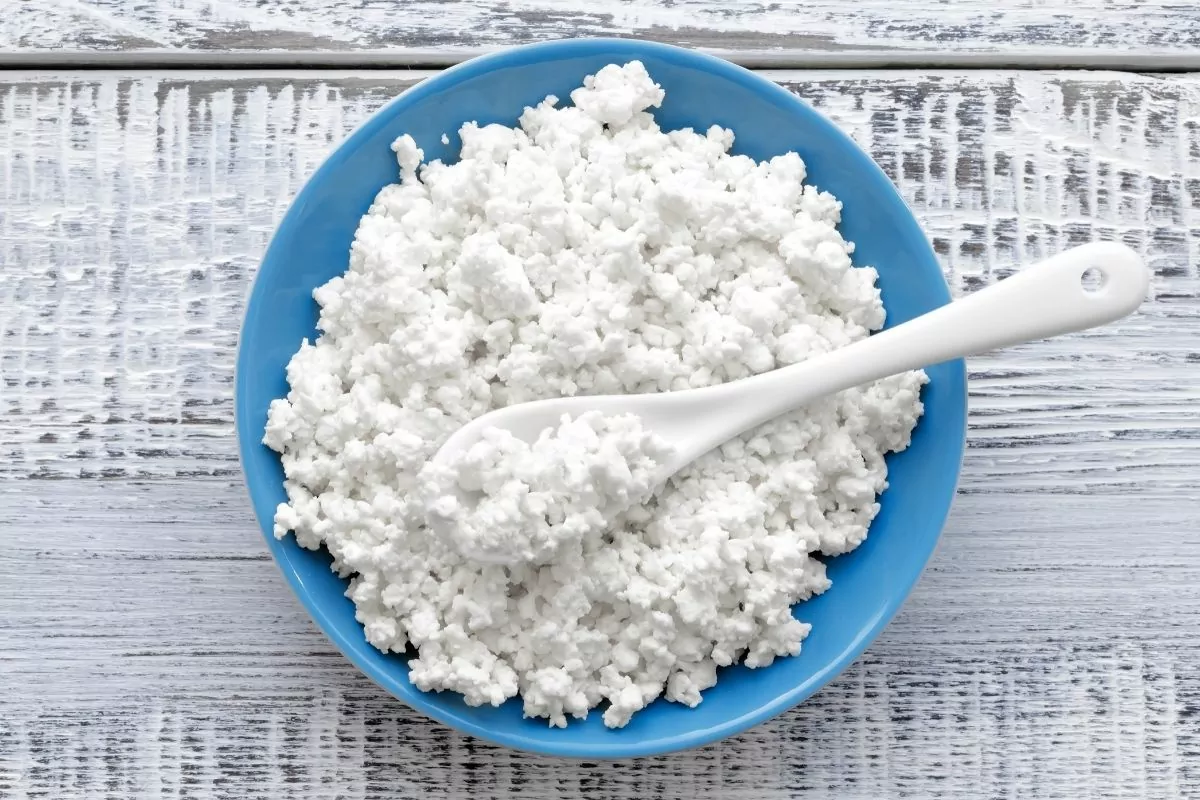Can Dogs Have Cottage Cheese?
Dogs and cheese go together like peanut butter and jelly. Your pets are quite likely to eat almost any cheese presented to them, but is cottage cheese good for dogs? The answer lies within your dog’s ability to tolerate dairy products.
Dogs lose the ability to digest lactose after they are weaned. Lactose needs to be broken down by the enzyme lactase to prevent gastrointestinal upsets. If fed in moderation and if your pet tolerates dairy products, cottage cheese has some great benefits.

Why is Cottage Cheese Good for Dogs?
The beneficial properties of cottage cheese for dogs can include the following:
Nutritional Benefits of Cottage Cheese
- Low in fat and calories: This offers a great treat source for your dog without adding too much to their daily food calorie intake.
- High in protein: dairy-based proteins can help increase dietary intake of proteins for a short period, if indicated, for example, in lactating dogs or dogs with poor appetites. Dogs absorb protein more effectively from meat protein sources, so serving balanced meals to your pet is essential.
- Rich in calcium, vitamins, and minerals, including essential fatty acids, Vitamin B12, potassium, and selenium. These nutrients are great for young growing dogs or pregnant and lactating bitches.
Health Benefits of Cottage Cheese
- Anorexic or ill dogs tend to have depressed appetites. Cottage cheese’s great taste and texture can help stimulate food intake during clinically critical periods. This could help your pet recover faster.
- Dogs can be lactose intolerant and don’t always digest dairy well, but cottage cheese is fermented and contains very little lactose. This means that dogs with digestive challenges can still tolerate cottage well, especially the low-fat varieties.
How to Feed Your Dog Cottage Cheese Safely
When considering feeding your pet cottage cheese, it is always important to remember moderation is key. Cottage cheese can lead to weight gain and potentially pet obesity if fed too frequently or in high quantities.
Gastrointestinal upsets can also occur if too much lactose is digested. If full-fat cheese is fed, this can lead to dog diarrhea, dog bloating, vomiting, or even canine pancreatitis.
What cottage cheese is good for dogs? Always feed them plain, low-fat, low-sodium cottage cheese and ensure there are no additives, including garlic, onion, or chive extracts, as they are toxic to dogs.

Precautions to Take When Feeding Your Dog Cottage Cheese?
The following precautions should be observed when adding cottage cheese to your pet’s diet:
- Canine Lactose intolerance: If your pet shows any gastrointestinal upset after being fed cottage cheese, it is best to stop feeding them cottage cheese.
- Dog breeds with high predisposition to pancreatitis: Small breed dogs, such as Yorkshire terriers, Chihuahuas, Miniature Pinscher, and Toy poodles, have an increased risk of developing pancreatitis if fed high-fat cheeses.
- Avoid high-sodium cottage cheese variations: Dogs do not tolerate high-sodium meals well.
- Moderation: Even with all the health benefits, it is still important that cottage cheese does not constitute more than 10% of your pet’s diet.
Lactose Intolerance in Dogs
Lactose is a type of sugar found in milk. Most puppies lose the ability to digest lactose properly, as they have a decreased production of the lactase enzyme after being weaned. Undigested lactose draws fluid into the colon and causes osmotic diarrhea. It can also cause bloating, abdominal pain, and vomiting.
If your dog develops any gastrointestinal symptoms, it is best to stop feeding dairy and consult with your veterinarian if the problems persist.
Is Cottage Cheese Good for Dogs?
Due to cottage cheese’s nutritional benefits and its great taste and flavor, it is good for dogs that are not lactose intolerant, overweight, or at high risk for pancreatitis.
Will Cottage Cheese Cause Constipation or Gas for my Dog?
If your pet has an underlying dairy allergy or lactose intolerance, cottage cheese may cause canine constipation or flatulence. It may also cause diarrhea. It is best to introduce a novel diet addition slowly and one item at a time to determine if it is causing any adverse effects.
If your pet is ill for longer than 48-hours, it is best to consult with your veterinarian to avoid serious illness complications.
FAQs on Dogs and Cottage Cheese
Here are a few frequently asked questions about cottage cheese:
Is Cottage Cheese Good for Dogs With Upset Stomachs?
Cottage cheese is a well-known home remedy for an upset stomach. The textured cheese can appeal to dogs with depressed appetites. It will only help with mild gastrointestinal upsets.
If your dog continues to be ill for longer than 12 hours, it is best to consult a veterinarian.
Can a Diabetic Dog Eat Cottage Cheese?
Diabetic dogs should always have regular, balanced meals, and any dietary alteration or additions should be discussed with a vet first. Insulin levels can be affected by the slightest dietary change, which could affect your pet’s glucose curve.
Controlling your pet’s glucose with the correct dosage of insulin is critical. Eating food they do not normally consume can cause glucose spikes and canine hyperglycemia symptoms. A complete diet either devised by a veterinary nutritionist or produced by a reputable prescription diet manufacturer is always the safest option.
Is Cottage Cheese Good for My Dog’s Dry skin
Cottage cheese does not contain many essential fats, oils, vitamins, or minerals that could improve skin conditions.
Is Cottage Cheese Healthy for Dogs Lactating?
Lactating bitches have a very high-calcium demand, and excessive calcium supplementation can suppress the parathyroid gland in dogs. Downregulation increases the risk of hypocalcemia and eclampsia.
Most lactating bitches will fare best on a commercially produced, recommended-best puppy food brand.
Is Cottage Cheese Good for Pregnant Dogs?
It is not advisable to feed your dog cottage cheese during pregnancy. Feeding a pregnant bitch calcium-rich foods like cottage cheese can increase the risk of canine eclampsia.
Eclampsia is caused by a sudden increased demand for calcium due to lactation. Supplementing calcium during pregnancy leads to downregulation of the calcium regulatory system, which leads to hypocalcemia when calcium demand is high.
High-risk factors include small breed dogs and calcium supplementation in the last two weeks of gestation. To avoid eclampsia, pregnant bitches must be fed high-quality, nutritionally balanced puppy food to help keep up with the high-metabolic demand of pregnancy and lactation.
What Are Some Alternatives to Feeding Your Dog Cottage Cheese?
Several commercial dog treats have great flavor and low-calorie counts and are great alternatives to cottage cheese. Other options can also include plain peanut butter dog treats with no sugar, xylitol (causes xylitol toxicity in dogs), or salt added if your pet does not have a nut allergy.
Can Puppies Eat Cottage Cheese?
Puppies have a lower likelihood of being lactose intolerant, as they still produce some lactase. This means that they can be fed cottage cheese if introduced gradually and in moderation.
Monitor their stools using our dog poop chart, and look for any signs of gastrointestinal upsets like cramps, diarrhea, or vomiting and stop feeding cottage cheese if they occur.
A properly formulated puppy food is the best for a growing puppy, especially large breed puppies. The additional calcium in cottage cheese can alter the important calcium: phosphate ratio that adversely affects joint health if unbalanced from a young age.
Therefore, cottage cheese should ideally be used as an occasional dog treat instead of a dietary staple.

Can Dogs Eat Cottage Cheese Daily?
If your dog is not lactose intolerant, allergic to dairy, overweight, pregnant, lactating, or has dog diabetes, they can enjoy cottage cheese daily. However, ensure that your dog’s caloric needs are met and not exceeded if they receive cottage cheese in their daily meals.
Final Thoughts
So, is cottage cheese good for dogs? When adding any treat to your pet’s diet, ensure that it is done gradually and fed in moderation. Cottage cheese should not make up more than 10% of your dog’s daily dietary ration.
Cottage cheese for dogs has its benefits and drawbacks, so be sure to monitor your dog’s overall health and intake if they eat it regularly.
